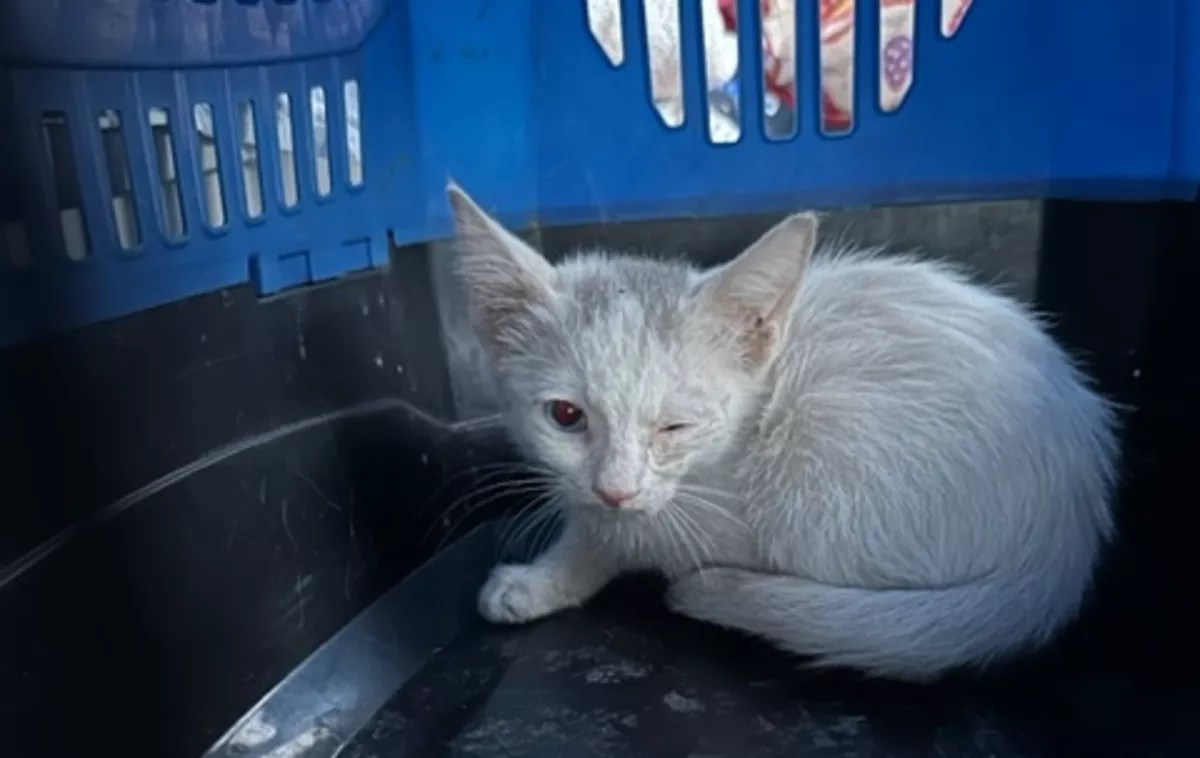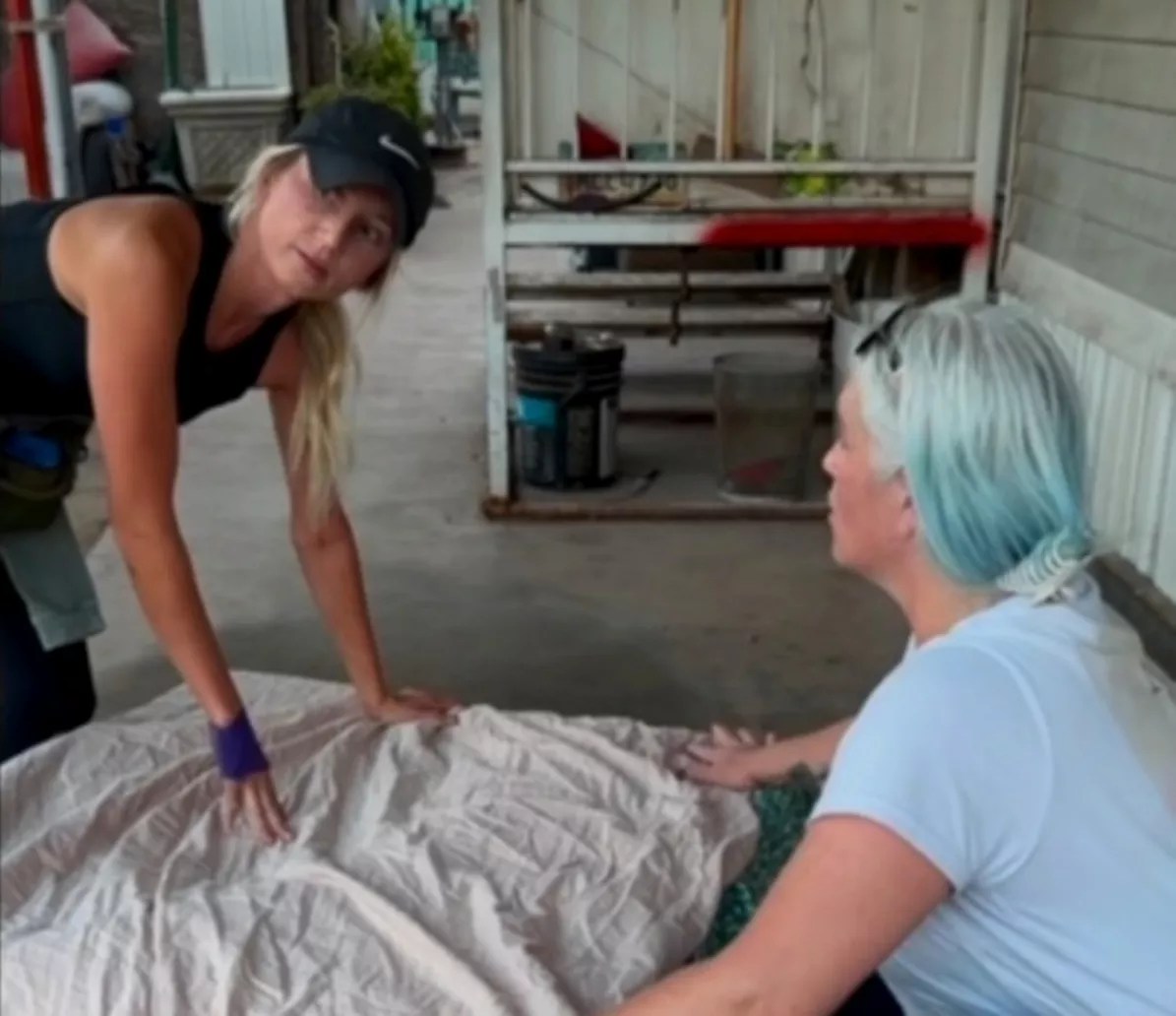
Courtesy of Alexandra Zacovic

Audio By Carbonatix
In the early morning hours of June 17, a young woman walking through a South Phoenix trailer park was approached by a kitten. It made for a disturbing sight. The kitten’s ears had been cut off and one of its paws was wounded. Patches of fur were missing. It needed help.
The young woman called Kai’s Place, a local shelter, for help. When cat rescue volunteers arrived at the trailer park, they found the earless cat and many, many more. In the following days, a team of trappers caught a dozen injured cats and estimated there to be 20-30 more around the neighborhood. One of the trappers, Alexandra Zacovic, guessed there could be as many as 50.
“In order to get some of these cats, we are crawling under trailers, we are sloshing through filth, we’re sloshing through dead carcasses,” said Kai’s Place founder Brittany De Soto. “I mean, it’s a lot.”
Many of the cats “clearly had suffered human abuse,” De Soto said. A 4-month-old kitten was found with “his tail cut off, a chunk of his leg missing, his tiny skull shattered from blunt force trauma,” Zacovic wrote on a GoFundMe page raising money to treat the cats. Others were found with degloved tails – that is, with the skin of their tails removed – and open wounds.
“What we found was pretty gruesome,” said De Soto.
Is someone at the trailer park, which is located on the 3000 block of East Southern Avenue in South Phoenix, torturing stray cats? While the volunteers who trap and treat them feel certain – “We have verified from the medical team that it is human abuse,” De Soto said – the authorities tasked with investigating animal abuse cases aren’t nearly as sure. And because of that, if someone is torturing and maiming cats, it may be difficult to bring them to justice.
Zacovic said that after she found the cats, she informed Phoenix police. She said police told her they would not respond because there was no evidence to tie the alleged abuse to a suspect. However, Phoenix police spokesperson Lorraine Fernandez told Phoenix New Times that an officer did respond but “did not locate any animals in distress when he arrived, and there was no one to contact for further information or additional details.” Fernandez said the caller specified “no contact.”
Zacovic said she was able to get through to the Maricopa County Sheriff’s Office through a friend with a connection to Sheriff Jerry Sheridan. However, sheriff’s office spokesperson Dave Moyer told New Times that the agency did not respond to the location because it’s in the jurisdiction of Phoenix police, which did not ask for assistance.
The lack of official response bothers Zacovic.
“It’s a little frustrating because it shouldn’t be about who you know, you should do your job for the right reasons, which are to help protect and make sure that people breaking the law are held accountable,” she said. “And that’s what we in rescue are seeing a lot of lack in.”

Alexandra Zacovic (left) and Brittany De Soto (right) say they’ve helped rescue at least a dozen stray cats from a south Phoenix trailer park. They think the cats have been abused.
Courtesy of Alexandra Zacovic
No suspects
Proving that someone is intentionally harming cats at the trailer park is an uphill battle, said Arizona Humane Society field manager Ruthie Jesus.
AHS contracts with 17 cities and their police departments, including the Phoenix Police Department, to assist in the investigation of animal crimes. Jesus, who is an emergency animal medical technician and certified animal cruelty investigator, said that her team responded to more than 17,000 calls for service last year. Almost 70% of them were animal cruelty investigations.
Jesus found out about the trailer park cats through someone who had attended a class she facilitated. She did not examine the cats personally; Jesus said the trappers were concerned that if the neighborhood became flooded with investigators, press or law enforcement, neighbors might prevent them from trapping the remaining cats.
Though Jesus praised the trappers for obtaining shelter and medical attention for the cats, what’s been relayed to her about them doesn’t strike her as slam-dunk intentional abuse.
“Some of the injuries she described to me would be things my team commonly sees for cats that have been clipped by a car, or maybe were sleeping in a car engine and the engine got turned on or were attacked by another animal,” Jesus said. Even if the cats are being abused, the fact that they are strays complicates any investigation. She estimated there to be around 200,000 free-roaming, feral cats in Maricopa County.
“What’s really tough with kitties that are free-roaming is you have no idea where they got injured, how long ago it happened, and none of the cats (Zacovic is) trapping are contained to one person’s property,” Jesus said. “So, there’s not really a suspect.”
According to the Maricopa County Attorney’s Office website, 100 animal cruelty cases were prosecuted between 2022 and 2024. But Zacovic feels the prevalence of such abuse is far greater than that, and she thinks people get away with animal abuse because “they know the city, and Maricopa County in particular, does not take animal crime seriously.”
“It’s really sad,” Zacovic said. “This trailer park situation that we’re dealing with now, it’s one in a thousand that are happening this second. I’m happy that people took interest in this one, but this is all over.”
Shelters like Kai’s Place and trappers like Zacovic can’t prosecute and they don’t have subpoena power to force people to answer their questions. All they can do is capture and help the cats. Providing medical attention to a large number of cats all at the same time costs a lot of money. Non-profit shelters like Kai’s Place – which is foster-based and runs out of the homes of around 18 people – aren’t rolling in dough.
That’s why Zacovic started the GoFundMe page, which has raised $4,555 of its $5,000 goal as of July 21. They’ve been able to pay for medical care for many cats, including some surgeries, but they need more. De Soto said they would raise the GoFundMe goal to $10,000 because of the number of cats in poor condition, though that hadn’t happened yet. They also need foster placements for the cats.
Zacovic and De Soto feel overwhelmed. Then again, they say, that’s normal.
“I’m providing the medical care, I’m rescuing, I’m running a rescue and I have kids too, so I have my own personal life,” De Soto said. “Right now, my whole life is revolved around this case.”